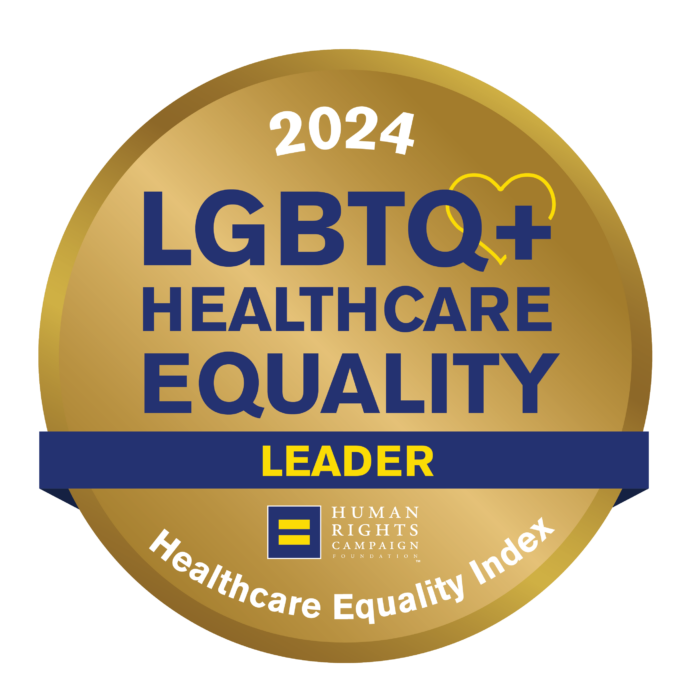Grinnell Regional Medical Center, Iowa Methodist Medical Center, Iowa Lutheran Hospital, Methodist West Hospital and Blank Children’s Hospital were named five of the 384 healthcare facilities nationwide earning the “LGBTQ+ Healthcare Equality Leader” designation.
(GRINNELL, IA – May 14, 2024) UnityPoint Health – Grinnell Regional Medical Center (GRMC) and UnityPoint Health – Des Moines (UPHDM) announced their “LGBTQ+ Healthcare Equality Leader” designations from the Human Rights Campaign Foundation (HRC). These designations were awarded in the 16th iteration of HRC’s Healthcare Equality Index (HEI), released on May 7. This is the first time that GRMC has been recognized by HRC at the Leader status and the fourth time in a row that UnityPoint Health – Des Moines hospitals have been named at the Leader status. A record 1,065 healthcare facilities actively participated in the HEI 2024 survey and scoring process. Of those participants, 384 received the top score of 100, earning the “LGBTQ+ Healthcare Equality Leader” designation.
GRMC and UPHDM are being recognized as an LGBTQ+ Healthcare Equality Leader for their work:
- Creating a workforce where everyone belongs and is supported through inclusive policies and benefits.
- Supporting our community’s healthcare needs and providing open and respectful care environments, including a dedicated LGBTQ Clinic.
- Supporting community initiatives to advance LGBTQ+ rights in Iowa.
“As anti-LGBTQ+ extremists look to strip away healthcare access at every turn, LGBTQ+ people and their loved ones are looking for healthcare providers to offer and champion fully inclusive services, The Healthcare Equality Index is helping people find facilities where welcoming policies and practices are the standard,” said Kelley Robinson, President of the Human Rights Campaign. “We know that LGBTQ+ people – especially our trans family – continue to face discrimination in the doctor’s office. No one should have to put their health on the backburner for fear of mistreatment in a healthcare facility or by their doctor.”
Key highlights from the report include:
- 36% of 1,065 total participants earned the designation “2024 LGBTQ+ Healthcare Equality Leader.”
- Targeted Health Disparities Reduction Plans: Encouragingly, 71% have an official plan for reducing health disparities that specifically includes LGBTQ+ patients in addition to race, ethnicity, and linguistic concerns.
- Work to Be Done: Only 27% have an externally promoted specific program to provide patient navigation or advocacy services to transgender patients.
- Bias Elimination and Welcoming Interactions: Just over half (53%) have a policy or policies that specifically outline procedures and practices aimed at eliminating bias and insensitivity, and ensuring appropriate, welcoming interactions with transgender patients.
- EHR SOGI Data: Major increases are seen in the number of healthcare facilities collecting sexual orientation and gender identity-related data in their Electronic Health Records systems. Seven of the eight relevant data points had double-digit increases.
- Pronouns in Electronic Health Records: The ability to collect and display a patient’s pronouns rose from 44% to 74%. This is an important tool to help prevent misgendering a patient.
- FMLA-Equivalent Benefits: 38% offer FMLA-equivalent benefits that allow employees to take family and medical leave to care for same-sex partners as well as the children of a same-sex partner, regardless of biological or adoptive status – this is up from 34% in 2022.
- Comprehensive Benefits for Domestic Partners: 41% provide medical and comprehensive health benefits to domestic partners of benefits-eligible employees up from 34% in 2022. This is the first increase in this measure since the 2015 Obergefell decision on same-sex marriage.
- Employee Resource Groups: 72% have an officially recognized LGBTQ+ employee resource group.
- Community Engagement and Support: 92% took part in or supported one or more LGBTQ+ related events or initiatives in their service area.
This year’s HEI comes as LGBTQ+ adults are twice as likely as non-LGBTQ+ adults to be “treated unfairly or with disrespect by a doctor or healthcare provider” in the last three years, according to the Kaiser Family Foundation. The impact of anti-LGBTQ+ legislation combined with a history of discrimination in healthcare settings has the potential to cause even more LGBTQ+ people to delay or avoid seeking healthcare, which makes the HEI even more salient for those looking to find LGBTQ+-inclusive care.
###
The Human Rights Campaign Foundation is the educational arm of the Human Rights Campaign (HRC), America’s largest civil rights organization working to achieve equality for lesbian, gay, bisexual, transgender and queer (LGBTQ+) people.
UnityPoint Health – Des Moines has more than 8,100 employees and 1,000 physicians providing convenient care to patients in central Iowa through our integrated network of clinics, hospitals and home care services. UnityPoint Health – Des Moines is made of up Iowa Methodist Medical Center, including Younker Rehabilitation and central Iowa’s only Level I Trauma Center; Iowa Lutheran Hospital; Methodist West Hospital; Blank Children’s Hospital, including pediatric sub-specialty clinics; John Stoddard Cancer Center; Grinnell Regional Medical Center; Eyerly Ball Community Mental Health Services; UnityPoint Clinic; UnityPoint at Home and UnityPoint Hospice.
UnityPoint Health – Grinnell is a nonprofit and non-tax supported rural health care provider serving more than 40,000 residents in a six-county rural area of east central Iowa. UnityPoint Health – Grinnell includes Grinnell Regional Medical Center -a 49-bed hospital- as well as the Manatt Walk-In Clinic, Grinnell Family Practice, Montezuma Medical Clinic, Public Health, UnityPoint at Home and UnityPoint Hospice. It is comprised of physicians and allied health care professionals who provide an array of services from birth to end-of-life. Specialties include bariatric surgery; emergency medicine; family medicine; general surgery; geriatric medicine; internal medicine; laboratory and imaging services; maternal health; obstetrics/gynecology; orthopedics; otolaryngology; pain management; pathology; podiatry; and physical,





